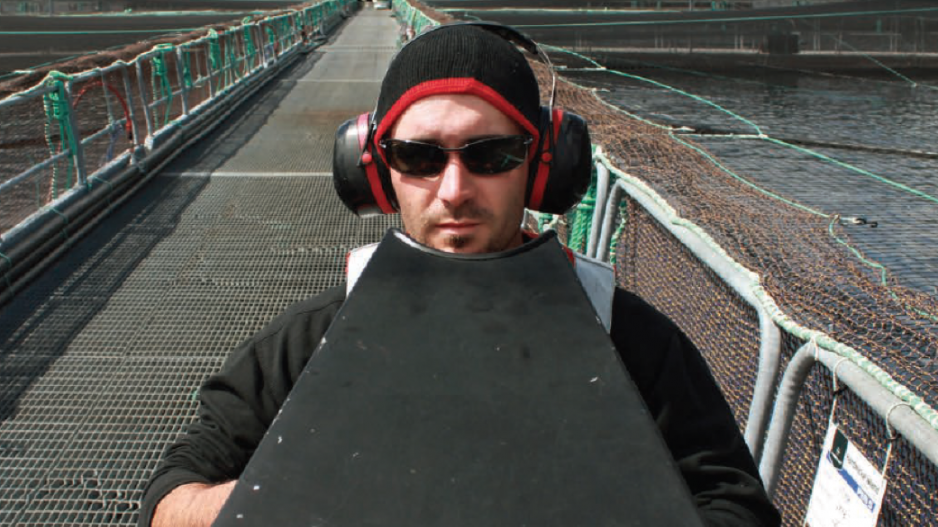Companies operating salmon farms in the Broughton Archipelago have been given four years to get the consent of First Nations to continue operating, otherwise they will have their provincial tenures cancelled.
Twenty provincial tenures expired today, and federal tenures are set to expire in 2022. The provincial tenures will be renewed on a month-to-month basis for the next four years.
Should the companies fail to get the consent they need, they could have their tenures cancelled with a 30-day notice.
Of the 20 tenures up for renewal, Marine Harvest holds 11, 10 of which expired today. The others are held by Cermaq, which has eight, and Grieg Seafood, which holds two.
"We acknowledge that many factors are affecting wild salmon, and one of them is fish farms," said B.C. Agriculture Minister Lana Popham. "Wild salmon are critical to the well-being and culture of many B.C. First Nations. That's why salmon farming operations must work in full partnership with the First Nations whose territory they wish to do business."
While the province issues tenures for the use of land and the seabed, it's the federal government that has the most jurisdiction over fish farms.
The B.C. government is essentially leaving it up to the industry and the federal government to satisfy both First Nations and the general public that salmon farming does not pose a serious risk to wild salmon.
"We're glad we have some time to have those discussions and hopefully find a resolution," said Jeremy Dunn, community relations manager for Marine Harvest.
"We've got a 20-year track record of building partnerships with First Nations. We have agreements in most of the areas that we operate and we believe that we can develop the partnerships with communities that are looking to develop their economies."
Getting First Nations consent is rife with potential complications, however. For one thing, while First Nations like the Namgis are unequivocally opposed to fish farming, other First Nations in the area support and work with the industry.
There have also been cases where hereditary chiefs have opposed projects supported by an elected band council. So it's not clear whether consent would have to come in the form of a band council resolution, community referendum or some other kind of agreement.
Asked to define what consent means, Popham said that would be up to First Nations themselves. She also said that salmon farmers already have some agreements in place with First Nations, which may be something of a template to use.
"We might look to how those are being done now," Popham said.
In the case of overlapping territories and disagreement, the province may have to arbitrate the question of which First Nation has the stronger strength of claim.
One First Nation that is unlikely to give consent is the Dzawada̱ʼenux̱w in Kingcome Inlet. Just yesterday, June 19, the Dzawada̱ʼenux̱w filed for a court injunction to block any renewals of fish farm tenures in the Broughton Archipelago.
The B.C. government has come under intense pressure from environmentalists, First Nations, the Pacific Salmon Foundation, commercial fishermen, and even a government employees union – the BCGEU – to phase out open-net fish farms, as Washington State is doing.
The B.C. government has formally adopted the United Nations Declaration on the rights of Indigenous People (UNDRIP), which requires the “free, prior and informed consent” of indigenous people for development and resource extraction in their traditional territories. That has been read by some to give First Nations a veto.
"There is no veto," Popham insisted.
The government's decision to give the industry four years to negotiate was slammed by the Green Party, which said the new policy continues to put wild salmon at risk.
“Frankly, I am embarrassed for our province that the measures that will be implemented in four years are not already happening,” Green MLA Adam Olsen said in a news release.
“It’s like surgeons announcing that starting in 2022 they are going to start washing their hands before procedures. This should have been the standard all along. The government of B.C. has just sold out wild salmon and are using First Nations as cover. Allowing fish farming to continue as is for four more years is a failure of leadership in Victoria.”
Stewart Muir, executive director for Resource Works, thinks the industry will find a solution.
The bigger picture concern isn’t just the message the B.C. government is sending to the salmon farming industry, but to all other resource industries that rely on provincial tenures, from forestry to mining and oil and gas.
“This is not just about salmon farming,” Muir said. “Anyone whose business depends on a lease or a tenure of some kind with the province of British Columbia, where there are aboriginal territorial claims – whether it’s land or water – will be looking at this decision.
“It’s a signal that things are being done differently in B.C. – maybe for good, maybe not for good – in ways with currently unknown and unforeseeable impact. So business uncertainty has been added to the business environment today.”
There are a total of 120 tenures for fish farms in B.C., twenty of which are now expired, and 26 that are currently on a month-to-month basis. Others and their expiration dates are:
• 26 expiring between 2023 and 2030;
• 38 expiring between 2031 and 2035;
• 5 expiring between 2035 and 2046.




